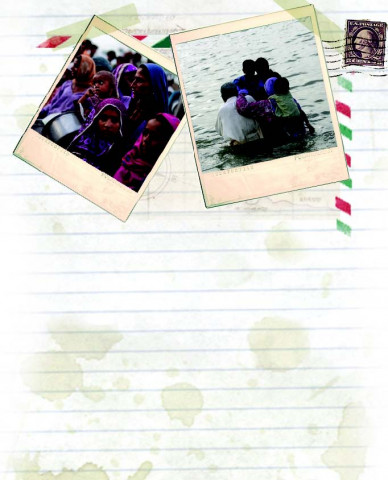Hotbed of revolution or human stables
In these camps, the stronger men clearly have a better chance of survival.

In these camps, the stronger men clearly have a better chance of survival. I watch in complete awe as they snatch relief goods from the weaker men, women and children. The elderly are completely dependent on their relatives.
And among these people, are those commonly known as the “sufaidposh” - those who were well-off in their previous lives and were in the position to give charity to the less fortunate. The tables have been turned - Mother Nature has been the great leveller. Today these very people, who have no experience asking for help, must ask if they want to survive.
I spend quite some time at the Sukkur Degree College campus that has been converted to a model relief camp. I sit with the survivors to understand and feel their pain and difficulties. Some of them have come to Sukkur for the first time. They are happy about it, but then the burden of surviving and protecting their families in deplorable conditions also makes them sad.
Jan Mohammed is probably the oldest man in the camp at 95 years. On the first day of his arrival, he was completely exhausted. His son carried him all the way from Rahimabad, Shikarpur. He looks as if he won’t make it back home. I keep checking on him and the others almost on a daily basis. In a few days, Jan Mohammed regains some of his health. His wife, who is just as old, was brutally beaten up by the police.
I ask her why it happened. She says one of her sons suffers from low-blood sugar levels and was in a bad way because of the poor diet. “Nawaz Sharif was here yesterday and I went looking for my son in the melee,” she says. “I was worried about him.” She herself was shaking like a leaf.
The relations between the refugees and the locals also reveals much about the conditions in the camps. Traditionally, the host community shows hospitality to the people who seek refuge. But in the camps I notice that the locals are in the forefront of looting relief goods and taking a share by posing as refugees. But as the days pass, the displaced people learn this art too. Then there is a fight over who can loot more.
The provincial government is conspicuously absent in Sukkur and Thatta and philanthropists find it hard to deliver because of the competition among refugee groups as well as the locals to get their hands on the aid.
This reveals the poor financial condition of the locals, who are not much better off than the survivors.
I catch up with Interior Minister Rehman Malik at the Circuit House helipad in Thatta. I tell him that life in the relief camps is far from satisfactory. He admits that the local administration has been incapacitated by the calamity and that they had little or no experience in coping with floods of this magnitude.
I ask why the politicians are not being taken to task for safeguarding their farmlands at the risk of drowning poor haris. “I promise I will take action against politicians who may be involved in breaching the bunds and willfully endangering the lives of hundreds of thousands and displacing millions,” he says. “But quite frankly, the floods came down like a bullet, breaking all the bunds that came in their way. No human being can willfully breach a bund to save his farms and crops. But nevertheless, if we receive a complaint, we will investigate and take action.”
Survivors need something to cling to. Some hope to stay alive. Now that they are slowly emerging from the trauma and know they have survived the floods, they are asking questions. When will the water recede in my area? When will I be able to go back home? What happens if I have to stay in the relief camps for longer? Will I get food, shelter and security here? What about health and education?
To be continued
Published in The Express Tribune, September 1st, 2010.


















COMMENTS
Comments are moderated and generally will be posted if they are on-topic and not abusive.
For more information, please see our Comments FAQ